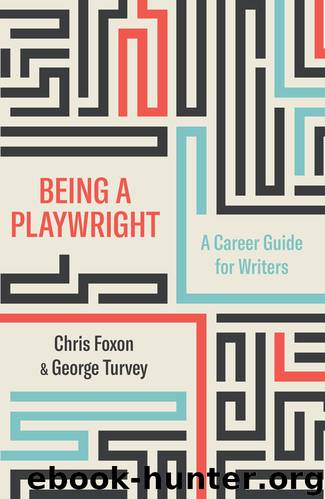Being a Playwright by Chris Foxon

Author:Chris Foxon
Language: eng
Format: epub
Publisher: Nick Hern Books
What am I pushing?
Finally, understand what ask you are making of a venue or producer. Do you want them to read your script as an introduction to your work and with an eye on future collaborations? Or is this an invitation to develop and produce the play? Is this a potential world premiere, or are you hoping for a professional production of a play that’s previously run the gamut of amateur or fringe productions? In short, what kind of proposal are you making and how should you frame this to give yourself the best chance of success?
The classic model is simply whizzing a script in as an unsolicited submission and letting the play speak for itself. This is what we’d recommend in nine out of ten cases. Whatever extraneous information you add, be it information on its history at scratch nights or the development process, is only likely to complicate matters. These may even be used as reasons for a decision-maker to say no. Of course, if some big names are attached, or if there has been a previous showcase or run that earned some nice reviews, you may include these as a marker of quality (see the chapter on ‘Reflecting’). Just consider how much, if any, information is needed to supplement the script – and make sure that this fits with your ask.
Sometimes writers accompany a script submission with a description of the director/designer/cast they’ve assembled. This is natural; often scripts have been tried out in scratch nights or workshops, other artists have become enthused, and the playwright naturally sees this as a step forward. A degree of loyalty to those who have been part of the journey thus far is also creditable.
Certainly, in some cases the accrual of other artists is like the grit that nurtures a pearl. It may well be appropriate to pitch a script with a director or cast attached to a fringe festival with lots of slots to fill, or a receiving house that hires out its space, keen to be assured that whatever they programme will be delivered. Larger producing organisations, however, will seldom be drawn to scripts that are already halfway to production. As we noted in the section on organising showcases, most producers prefer to lessen the risk on a new play by assembling a crack creative team they can trust. Learning that the playwright has already made job offers on the producer’s behalf doesn’t inspire confidence; for every untried or unfamiliar artist involved, the risk factor leaps exponentially. Of course, if you have a name artist attached it’s a different matter – nonetheless, the pleasure for most producers is in shaping a play creatively. Few of us welcome being asked to pay for someone else’s show.
So, be aware of what you are asking for. Someone to develop you as an artist, or someone to come on board a project you’ve already begun? The nature of the ask will affect whom you approach and how you make the approach – if
Download
This site does not store any files on its server. We only index and link to content provided by other sites. Please contact the content providers to delete copyright contents if any and email us, we'll remove relevant links or contents immediately.
| Acting & Auditioning | Broadway & Musicals |
| Circus | Direction & Production |
| History & Criticism | Miming |
| Playwriting | Puppets & Puppetry |
| Stage Lighting | Stagecraft |
Call Me by Your Name by André Aciman(20521)
Ready Player One by Cline Ernest(14679)
How to Be a Bawse: A Guide to Conquering Life by Lilly Singh(7489)
Wiseguy by Nicholas Pileggi(5791)
The Kite Runner by Khaled Hosseini(5183)
On Writing A Memoir of the Craft by Stephen King(4947)
Audition by Ryu Murakami(4933)
The Crown by Robert Lacey(4818)
Call me by your name by Andre Aciman(4691)
Gerald's Game by Stephen King(4656)
Harry Potter and the Cursed Child: The Journey by Harry Potter Theatrical Productions(4507)
Dialogue by Robert McKee(4406)
The Perils of Being Moderately Famous by Soha Ali Khan(4221)
Dynamic Alignment Through Imagery by Eric Franklin(4218)
Apollo 8 by Jeffrey Kluger(3713)
The Inner Game of Tennis by W. Timothy Gallwey(3689)
Seriously... I'm Kidding by Ellen DeGeneres(3637)
How to be Champion: My Autobiography by Sarah Millican(3594)
Darker by E L James(3520)
